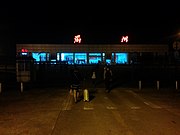Quzhou Airport
Quzhou Airport 衢州机场 | |||||||||||
|---|---|---|---|---|---|---|---|---|---|---|---|
 | |||||||||||
 Quzhou's civilian terminal from the causeway, with the air traffic control tower to the far left | |||||||||||
| Summary | |||||||||||
| Airport type | Military/Public | ||||||||||
| Owner | PLA Air Force | ||||||||||
| Serves | Quzhou, Zhejiang, China | ||||||||||
| Opened | 26 November 1993 | ||||||||||
| Built | c.1933 | ||||||||||
| In use | c.1933–present | ||||||||||
| Occupants | 85th Fighter Brigade | ||||||||||
| Time zone | (UTC+08:00) | ||||||||||
| Elevation AMSL | 65 m / 213 ft | ||||||||||
| Coordinates | 28°57′57″N 118°53′58″E / 28.96583°N 118.89944°E | ||||||||||
| Website | mhj | ||||||||||
| Map | |||||||||||
 | |||||||||||
| Runways | |||||||||||
| |||||||||||
| Statistics (2023[1]) | |||||||||||
| |||||||||||
Source:[2] | |||||||||||
| Quzhou Airport | |||||||
|---|---|---|---|---|---|---|---|
| Simplified Chinese | 衢州机场 | ||||||
| Traditional Chinese | 衢州機場 | ||||||
| |||||||
Quzhou Airport, also called Quzhou Air Base (IATA: JUZ, ICAO: ZSJU) is a dual-use military and civil airport located 2.9 kilometers east of the city of Quzhou in Zhejiang Province, China. Originally only a military airfield for the People's Liberation Army Air Force, the airport was first expanded for use by American bombers during World War II, and was later occupied by Japanese troops. A small passenger terminal opened to commercial flights on 26 November 1993, though expanded commercial use of the airport has been hampered by continued heavy military presence due to the airport's proximity to the East China Sea and Taiwan Strait.[3] Airlines operating out of Quzhou Airport generally operate medium to large narrow-body aircraft, such as the Boeing 737. Quzhou's commercial passenger terminal is unique in being separated from the airport's two aircraft bays by a lake, requiring passengers to walk across a lengthy causeway before boarding. The airport serves as the base of operations for regional carrier Quzhou Airlines.
History
[edit]World War II
[edit]Originally known as Hangzhou Air Base, in 1937 the facility was renamed Quzhou Air Base. Following the Japanese attack on Pearl Harbor in the winter of 1941, the airport began a major expansion for future use by United States Army Air Forces. The airport's strategic location played a key role in World War II, with American aircraft frequenting the base for replenishment. In April 1942 the base was to serve as the refueling point for the Doolittle Raiders following the strike on Tokyo, however because of incliment weather, all of them ran out of fuel prior to reaching the base, instead crash landing around the city of Quzhou. Chinese support from Quzhou drove the Japanese to launch the battle of Zhejiang and Jiangxi to suppress the airbase, with Japanese troops taking control of the base on June 3, 1942.[4][5]
First Taiwan Strait Crisis
[edit]In the early hours of June 23, 1956, Lu Min, then-commander of the 34th Regiment, 12th Air Division of the PLAAF, took off from Quzhou Airport with a MiG-17 fighter jet and shot down a Republic of China Air Force B-17 Flying Fortress over the Guangfeng and Shangrao areas of Jiangxi province, marking the first time PLAAF air defenses managed to shoot down an enemy at night.
Military use
[edit]Located 500 km from Taiwan just at the edge of effective cruise missile and airstrike range, Quzhou is one of the largest and most important air bases of the PLAAF. The airport is fitted with a hardened underground hangar to protect aircraft from adversaries.
The facility is home to the 29th Fighter Division, which flies the Sukhoi Su-30MKK, and the 85th Fighter Brigade, equipped with the Chengdu J-20 stealth fighter.[6]
Civilian use
[edit]The airport has a 1,900 meter (8,200 ft) runway (class 4C) and a 3,440 square-meter terminal building.[2][3] The airport can accommodate Boeing 737 and other medium to large narrow-body passenger aircraft. The passenger terminal building is 3,440 square meters, which can support 200 passengers during peak hours.
Airlines and destinations
[edit]See also
[edit]- List of airports in China
- List of the busiest airports in China
- List of People's Liberation Army Air Force airbases
References
[edit]- ^ "2023年民航机场吞吐量排名" (XLS) (in Chinese). Retrieved 2025-01-20.
- ^ a b Airport information for Quzhou Airport at Great Circle Mapper.
- ^ a b 衢州民航站 Archived 2012-05-02 at the Wayback Machine
- ^ "慑台新动作:歼-20进驻衢州机场,专家:去哪不重要,能力摆在那" [New action to deter Taiwan: J-20 stationed at Quzhou Airport, experts: It doesn’t matter where you go, the ability lies there]. Defense Times Vanguard (in Chinese). September 27, 2020. Retrieved 2022-12-15.
- ^ Jingtao, Yang (November 9, 2017). "营救美国大兵—记75年前浙江村民与美国飞行员那段往事-时政新闻-浙江在线" [Rescue American soldiers—Remember the past between Zhejiang villagers and American pilots 75 years ago]. Xinhua (in Chinese). Retrieved 2022-12-15.
- ^ "中国最"牛"的一座三线城市,市区拥有军民合用机场" [One of the most "beautiful" third-tier cities in China, the urban area has a military-civilian airport]. Toutiao (in Chinese). March 31, 2018. Retrieved 2022-12-15.
- ^ a b c d e "衢州机场2023年冬航季航班计划!新增临汾、西双版纳!". Retrieved 12 November 2023.
- ^ a b c d e "新航季!衢州机场换季后有哪些变化,快来看看~". Retrieved February 8, 2023.
- ^ a b c "10月27日起执行!衢州机场2024冬航季航班时刻表出炉". Retrieved 20 January 2025.
- ^ "【新航季】太原机场2022年冬春航季航班时刻计划". Retrieved December 19, 2022.
- ^ "航班换季 | 叮咚!珠海机场2023年冬航季航班时刻表,请查收~". Retrieved 7 November 2023.



